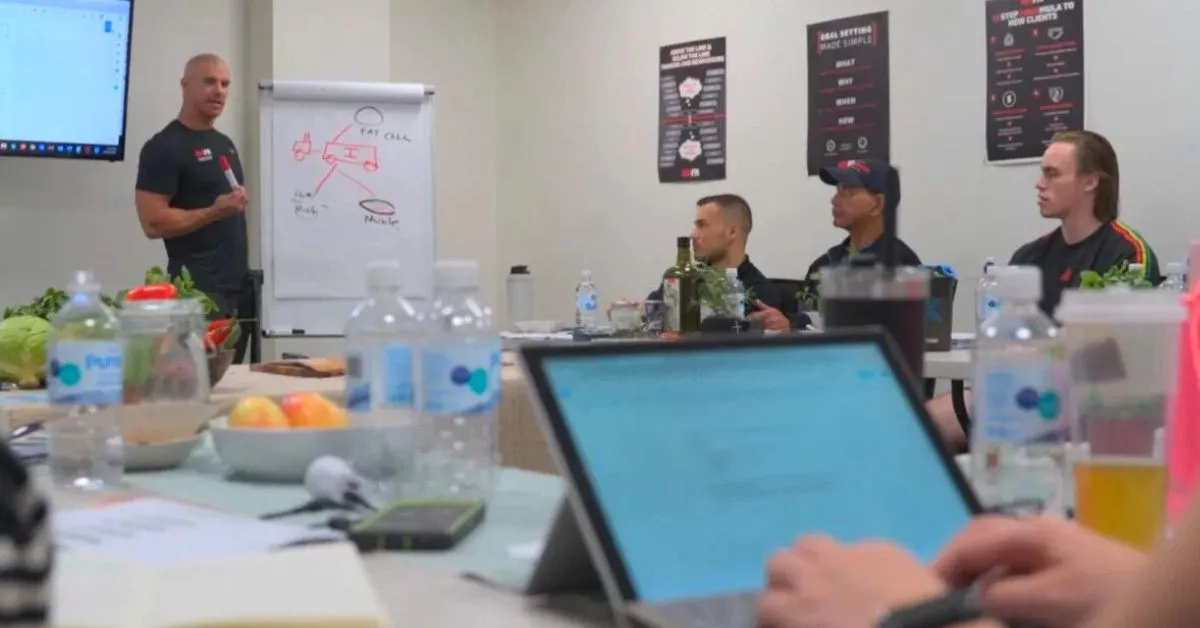
Nutrition coaching is about more than telling someone what to eat. It’s about understanding people: their habits, mindset, environment, and values.
Behind every nutrition plan is a person seeking change. Some want more energy or better performance. Others want to feel healthy again after stress or fatigue. Great coaches look beyond calories and macros; they help clients rebuild their confidence and their relationship with food.
The Connection Between Food and Mental Wellbeing
What we eat affects how we feel, think, and function. Balanced nutrition supports focus, mood, and motivation, while poor eating patterns can drain energy and confidence.
For clients, food is often linked to emotion. Stress, fatigue, or low self-esteem can easily influence eating choices. Nutrition coaches play a vital role in helping clients connect these dots – recognising how emotional triggers shape daily decisions.
Good nutrition can:
- Support stable mood and energy
- Improve sleep quality and motivation
- Reduce stress-related cravings
- Encourage positive self-perception and confidence
Coaching through these challenges means looking at the whole person, not just their plate.
Why Clients Seek Nutrition Coaching
Most clients don’t want just a meal plan: they want guidance, accountability, and understanding.
Some are training for performance goals. Others simply want to feel better or regain control of their health. In every case, the goal is not perfection, but progress.
A skilled coach helps clients make small, realistic changes that align with their lifestyle. They listen first, educate second, and help clients take ownership of their choices, so that healthy habits last long after the plan ends.
Coaching Beyond the Plate
Food is personal, and so is change. That’s why effective nutrition coaching combines science with empathy.
1. Educate Yourself
Understand the basics of nutrition and behaviour. Ask open questions, respect each client’s background, and always work within your legal scope of practice.
2. Set Realistic Goals
Clients succeed when goals are achievable. Restrictive plans can overwhelm and discourage – gradual improvement builds confidence.
3. Use Positive Reinforcement
Clients who struggle with food guilt or self-doubt respond best to encouragement, not pressure. Celebrate small wins.
4. Be Patient
Progress isn’t linear. A missed target isn’t failure: it’s feedback. Help clients focus on what went right and how to adjust next time.
When you combine empathy with education, you help clients build habits that last.
Looking Ahead: Nutrition Coaching and Australia’s Next Guidelines
Australia’s national dietary guidelines are currently under review, with updated recommendations expected in 2026.
According to a recent report by ABC Health & Wellbeing, the next version may extend beyond human nutrition to consider environmental sustainability, reflecting a global move toward “planetary health” diets. The article notes that newer guidelines in countries such as Denmark and Norway already encourage plant-rich eating patterns that benefit both people and the planet.
While these updates will modernise the national framework, the fundamentals remain the same: variety, balance, and moderation.
As RMIT nutrition scientist Dr Jessica Danaher reminded ABC Health & Wellbeing readers, “It’s a guide, not a rule book.”
For nutrition coaches, this shift is a reminder of the expanding role they play — guiding clients toward food choices that support their wellbeing and align with broader health and sustainability goals.
(Source: ABC Health & Wellbeing, “Why we might expect Australia’s next dietary guidelines to incorporate the environment”, 2025)
The Human Side of Nutrition Coaching
Coaches often work with people who are rebuilding their health and confidence. They may be managing stress, balancing work and family life, or struggling with motivation.
Nutrition coaching supports these clients by teaching balance, not restriction. It helps them see food as nourishment, not punishment. It’s a conversation that blends science, empathy, and practical strategy.
When you focus on the why behind choices, you give clients the tools to change their habits for good.
Final Thoughts
Great nutrition coaching is about transformation: not just in body composition, but in mindset and daily behaviour. It’s about helping clients reconnect with their health, feel more in control, and develop habits that serve them for life.
For a closer look at how belief systems shape eating habits, read Are Your Nutrition Beliefs Sabotaging Your Success?
If you want to coach people beyond the meal plan and build your expertise in nutrition, behaviour change, and sustainable health, explore NHFA’s Certified Nutrition Coach Program. You’ll gain the practical skills and professional credibility to guide real-world transformations, for both your clients and your career.
Want to coach change that lasts?
Become a Certified Nutrition Coach with NHFA
Learn how to combine nutrition science with mindset and behaviour-change tools to help clients transform their habits for good.
Schedule Call
